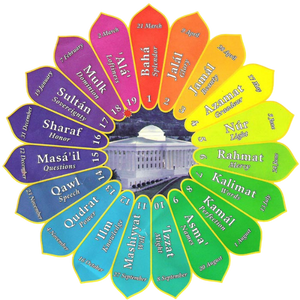The Bahá’í Faith is a unique and profound spiritual tradition that emphasizes the oneness of humanity and the importance of service to others. Among its numerous tenets, the observance of Holy Days stands out as a significant opportunity for Bahá’ís to reflect on spiritual ideals and engage in charitable activities. These days are not merely observances of religious significance but pivotal occasions for fostering community spirit, promoting goodwill, and contributing to the welfare of society at large.
The Bahá’í calendar comprises a series of Holy Days, each rich with historical and spiritual relevance. Among these, some of the most important are the Last Sunday of the month of Bahá, the Ascension of Bahá’u’lláh, and the Festival of Ridván. Each Holy Day provides Bahá’ís with an opportunity to engage in acts of charity and service that align with their spiritual beliefs and values.
The Last Sunday of the month of Bahá is an occasion that encourages reflection on one’s personal growth and service to humanity. During this time, Bahá’ís are urged to meditate on the teachings of Bahá’u’lláh, the founder of the Bahá’í Faith, which emphasize the profound interconnectedness of all people. Engaging in dialogues and discussions about community needs can often lead to initiatives that help those less fortunate. This observance serves not only as a moment for introspection but also for mobilizing community efforts that can lead to substantial social impact.
In contrast, the Ascension of Bahá’u’lláh, observed on May 29, commemorates the passing of the Faith’s founder. This solemn occasion provides an opportunity to reflect on Bahá’u’lláh’s life and his teachings, particularly his calls for justice and equity. Many communities utilize this Holy Day as a platform to engage in charitable acts, such as fundraising for local charities or organizing volunteer activities. By reflecting on the life of Bahá’u’lláh, Bahá’ís are reminded of the importance of striving for justice and the imperative of service, making it a pivotal moment to renew their commitment to social action and philanthropy.
Perhaps the most vibrant of all Bahá’í Holy Days is the Festival of Ridván. Celebrated over a twelve-day period, it marks the anniversary of Bahá’u’lláh’s declaration of his mission in 1863. During this festival, Bahá’ís gather for prayers, music, and community celebrations. Embodying the spirit of joy and fellowship, this festival is also a time during which Bahá’ís engage in acts of service. They may organize food drives, offer free community services, or provide educational workshops that address local needs. The emphasis on community well-being is palpable, as the shared joy of the festival is often intertwined with selfless service to others.
Beyond these specific days, the broader spectrum of Holy Days within the Bahá’í calendar has a critical underlying theme: the enhancement and elevation of humanity. Bahá’í teachings advocate for a life characterized by service, highlighting the significance of altruism as a core value in the pursuit of a harmonious society. Every Holy Day is an opportunity for Bahá’ís to consider how they can contribute positively to their local and global communities.
Moreover, the observance of Bahá’í Holy Days extends beyond mere ritualistic practices; it encompasses a holistic journey towards personal and communal improvement. This is often articulated through community service projects, educational initiatives, and philanthropic endeavors that align with the teachings of Bahá’u’lláh. In this light, the spiritual fervor of Holy Days becomes a catalyst for tangible change, allowing individuals and groups alike to address the pressing social issues faced by their communities.
Furthermore, research in social ethics from the Bahá’í perspective emphasizes the profound relationship between personal and collective spirituality. Engaging in charity and service during Holy Days cultivates not only individual virtues but also nurtures a collective consciousness geared towards alleviating suffering and fostering social equity. Such practices reinforce the belief that every action, no matter how small, contributes to the tapestry of global progress.
Charity within the Bahá’í context is expansive; it transcends the mere distribution of material goods. It encompasses acts of love, kindness, and support offered to others, emphasizing the necessity of uplifting the human spirit. As Bahá’ís celebrate their Holy Days, they are persistently reminded of their duty to embrace an ethos of service. This is manifested through educational outreach, health initiatives, and various community service projects aimed at empowering marginalized groups.
In conclusion, the observance of Bahá’í Holy Days serves as a resounding declaration of the Faith’s commitment to charity and service. These days are imbued with profound spiritual significance but are profoundly actionable, motivating Bahá’í communities to reflect on their collective responsibilities towards one another. Through service and charitable acts, Bahá’ís can truly embody the central tenets of their faith, fostering harmony, compassion, and justice in an increasingly fragmented world. Engaging with the spirit of these Holy Days empowers Bahá’ís not just to celebrate their spirituality but to enact it through tangible contributions to society.
